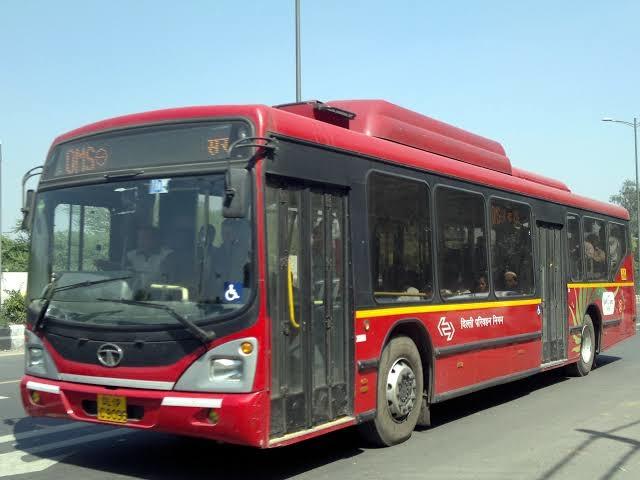Free Bus Rides for Women in Delhi: One Step Forward But More Needed

The network of public buses in Delhi—which play an important part in connecting the people of this city—has become even more accessible for lakhs of women passengers. Starting October 29, women are able to travel on capital’s public buses for free. Delhi Chief Minister Arvind Kejriwal, delivering the promise he made in June, announced the scheme for women adding that the free-ride scheme might be extended to senior citizens and all students as well.
This is a welcoming move considering that the decision will make public transport for women—who constitute nearly a third of the total 42 lakh daily bus ridership—more accessible and ensure their increased participation in the economy.
However, a city’s public transport needs to function efficiently with a service-oriented objective as its priority. While the Kejriwal government deserves applause for making buses more feasible and accessible, the government, sadly, has turned a blind eye to the poor health of the public bus service on other fronts.
Enter a DTC or its cluster-scheme bus, both at most times over-crowded, and the ill-conditions of the transport service will seem obvious: lesser fleet of buses serving an ever-increasing population and the employees, including females, under the clutches of contractualisation.
Also read: Free Rides for Women But No Travelling Allowances for DTC Workers
The facts and figures paint a similar picture. The number of operational DTC buses was 3,974 in the year 2017-18, as per Delhi’s outcome budget released earlier this year in June. The target set by the Kejriwal government was to raise the number up to 4,176 by 2018-2019. However, as opposed to the target, the number in fact decreased to 3,897. The fleet targets for cluster-scheme buses (commonly identified as orange buses) were not achieved either. The target was to raise the fleet size to raise to 2,758 in 2018-19, however only 1,679 were plying on the road in the same year.
What this means is that though more women commuters are invited through the free-ride scheme, the government seems least prepared given the depleting fleet size, making it difficult for the buses to accommodate new travellers. The announcement to run additional 5,000 buses in this regard seems not enough as, first, the requirement is much more, and what’s more is that only orange buses have been procured in the recent past. This means that the operation of buses goes to Delhi Integrated Multi Modal System (DIMTS) – a joint venture company between the Government of National Capital Territory of Delhi (GNCTD) and the IDFC Foundation (a non-profit organisation). The GNCTD holds 49.99% of its shares, making it a private company. The DIMTS projects have been under the lens of Comptroller and Auditor’s General of India (CAG) in the past, wherein the investigations have pointed towards a “special treatment” to the private company in awarding works which stood in violation of the established financial norms.
Also read: Delhi’s Outcome Budget Shows DTC in Poor Health
Another among the worries that has gripped the Delhi’s bus transport service is the rampant contractualisation of its workforce. Out of the 35,000 workers currently employed by the Delhi Transport Corporation (DTC), nearly 15,000—by conservative estimates—have been working on contractual basis. Speaking of cluster-scheme DIMTS buses, almost all the workers are contractual labourers. Their wages are not regular but on per kilometre basis which translates to much lower payments for the same job. They do not enjoy any social benefits. There have been recurrent cases of brutal violence used against them by the authority. It should be noted that the case is no different for women workers as well.
The union active in the circle, namely, DTC Workers Unity Centre (DWUC) have time and again staged demonstrations to raise the demands of the workers, however, their grievances remain unresolved.
“During the last Delhi Assembly elections, the Kejriwal government promised equal pay for equal work,” said Rajesh Kumar, General Secretary of DWUC, “however, regularisation of the jobs remains a far off dream for thousands of public bus workers.”
The union has now approached the Delhi High Court in the hope of taking legal course of action against the Kejriwal government for failing to regularise their jobs.
The launch of the cluster-scheme buses under DIMTS in July 2007, which translates to, corporatisation of the private stage carriage buses in Delhi, only meant further deterioration of the working conditions for the workers. The Kejriwal government has only joined hands with the previous governments in furthering the ‘privatisation’ of public transport. This is evident from the announcements that 1,000 new cluster buses will be procured whereas not even a single bus has been added to the Delhi government’s DTC since the Commonwealth Games in 2010, as per the union.
Also read: DTC Workers Hold Namak-Mirch-Roti Dharna Ahead of Oct 29 Strike
With the fulfilling of the free-ride promise ahead of the 2020 Delhi Assembly election, the Kejriwal government has taken a step forward in pushing the capital’s public transport in the direction of achieving more social gains. What is yet to be seen is if any more steps lie ahead of it, and whether those measures include regularisation of the jobs of the thousands of workers of the capital’s bus service.
Get the latest reports & analysis with people's perspective on Protests, movements & deep analytical videos, discussions of the current affairs in your Telegram app. Subscribe to NewsClick's Telegram channel & get Real-Time updates on stories, as they get published on our website.
























